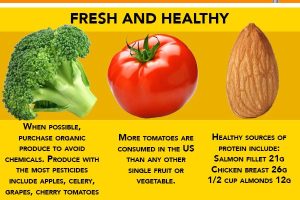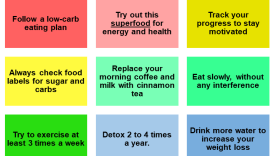Fuel Your Body Right: Nutrition Tips for a Healthier You

Healthy eating can feel overwhelming, especially with all the information floating around about diets and food choices. The key is to understand what our bodies really need in order to thrive. This journey into nutrition is not just about cutting calories or following the latest fad diet; it’s about finding a sustainable way to nourish ourselves. Imagine walking through a grocery store equipped with the knowledge to make informed decisions that can transform your wellbeing. In this guide, we will explore the fundamentals of nutrition, delving into macronutrients, micronutrients, hydration, meal planning, and even superfoods. Each of these components plays an essential role in how we feel, perform, and live our lives.
- Fuel Your Body Right: Nutrition Tips for a Healthier You
- Why Nutrition Matters
- Understanding Macronutrients
- The Importance of Carbohydrates
- All About Proteins
- Micronutrients and Their Roles
- Essential Vitamins
- Importance of Minerals
- Hydration and Its Impact on Health
- Benefits of Staying Hydrated
- How Much Water You Should Drink
- Meal Planning Strategies
- Importance of Balanced Meals
- Tips for Portion Control
- Superfoods for Optimal Health
- Benefits of Including Superfoods
- Top Superfoods to Include in Your Diet
Why Nutrition Matters
It’s not just about aesthetics; proper nutrition plays a critical role in overall health. Whether it’s boosting energy levels or enhancing mood, the food we eat has profound effects on our daily lives. Here’s why understanding nutrition is crucial:
- A balanced diet provides essential nutrients that support bodily functions.
- Good nutrition can help in maintaining a healthy weight.
- Proper dietary habits can reduce the risk of chronic diseases.
Consider your last meal. Did you feel energized afterward, or were you sluggish? This reflects the power of food choices. By learning about the building blocks of nutrition, readers can empower themselves to make choices that positively impact their health. Let’s embark on this exploration of nutrition together and uncover how to make mindful choices that benefit both our bodies and minds!
Understanding Macronutrients
As we dive deeper into the realm of nutrition, we come to the three primary macronutrients: carbohydrates, proteins, and fats. Each of these plays a vital role in our bodies, providing the essential energy and support needed to thrive. It’s like having a toolbox—each tool has a specific function that contributes to a bigger picture of health. Let’s break them down and understand why they matter.
The Importance of Carbohydrates
Let’s start with carbohydrates, often dubbed the body’s main energy source. Imagine going for a run or getting through an intense workout—carbohydrates are what fuel your body through those activities. They can be categorized into simple and complex forms.
- Simple Carbohydrates: Found in sugars like fruits and sweets, they provide quick energy bursts.
- Complex Carbohydrates: Found in whole grains and legumes, these digest slowly, providing sustained energy.
Including the right type of carbohydrates can keep energy levels consistent throughout the day. For instance, swapping white bread for whole grain could mean more fiber and nutrition, not just empty calories.
All About Proteins
Next up are proteins, the building blocks of our body. They are essential for muscle repair, hormone production, and overall growth. When training hard or recovering from an injury, adequate protein intake becomes even more crucial. Sources of protein vary widely, catering to different dietary preferences:
- Animal Sources: Chicken, fish, eggs, and dairy provide complete proteins.
- Plant Sources: Beans, lentils, tofu, and quinoa offer plant-based protein options.
Incorporating protein can be as simple as adding a handful of nuts to a salad or opting for fish rather than red meat for dinner. Balancing your meals with these macronutrients can result in improved energy, better recovery, and enhanced overall health. As we continue, we’ll explore the equally important micronutrients that complement these foundational building blocks.
Micronutrients and Their Roles
As we shift our focus from macronutrients, it’s time to illuminate the often-overlooked heroes of nutrition: micronutrients. These include essential vitamins and minerals that our bodies require in smaller amounts but are critical for numerous functions. Think of micronutrients as the fine-tuning of a well-oiled machine; they support everything from immune function to energy production.
Essential Vitamins
Vitamins are like superheroes in our diets, each working to protect and enhance different aspects of our health. For instance, vitamin C supports the immune system, while B vitamins are vital for energy metabolism. Here are some key vitamins to consider:
- Vitamin A: Good for vision and skin health. Found in carrots and leafy greens.
- Vitamin D: Essential for bone health and immunity. Can be obtained through sunlight and fortified foods.
- Vitamin E: Acts as an antioxidant. Nuts and seeds are great sources.
Incorporating a variety of colorful fruits and vegetables into your meals is one of the easiest ways to get these essential vitamins. For example, a smoothie packed with spinach, berries, and bananas can deliver a solid vitamin boost while being delicious!
Importance of Minerals
Moving on to minerals, they play an equally vital role in maintaining health. While vitamins are organic compounds, minerals are inorganic and include elements like calcium, potassium, and iron. Here’s why they matter:
- Calcium: Vital for bone health. Found in dairy products and leafy greens.
- Iron: Essential for oxygen transport in the blood. Great sources include lean meats and legumes.
- Magnesium: Supports muscle and nerve function. Available in nuts, seeds, and whole grains.
A balanced diet that includes an array of foods can ensure adequate mineral intake. For instance, a stir-fry with broccoli, tofu, and brown rice not only delivers essential carbohydrates and proteins but also a spectrum of vitamins and minerals. This combination supports overall wellness and vitality, setting the stage for our next exploration of hydration!
Hydration and Its Impact on Health
As we continue our journey through nutrition, it’s crucial to pause and reflect on hydration — a fundamental aspect of health that often gets overlooked. Just as macronutrients and micronutrients are vital for our diet, drinking enough water is essential for our body’s optimal functioning. Staying hydrated can be the difference between feeling sluggish and vibrant throughout the day.
Benefits of Staying Hydrated
Water serves as the foundation for nearly every bodily function. From regulating temperature to aiding digestion, the benefits of staying hydrated are plentiful. Consider these impacts:
- Enhanced Brain Function: Proper hydration can improve concentration and cognitive functions. A study even suggests that just a 1-2% drop in body water can hinder mental performance.
- Weight Management: Drinking water before meals can help control appetite, potentially leading to reduced calorie intake.
- Improved Physical Performance: Adequate hydration can boost endurance and reduce fatigue during physical activities.
Personally, I’ve found that simply carrying a water bottle throughout the day makes a world of difference in my energy levels. It’s a small reminder to keep sipping, especially when busy or on the go!
How Much Water You Should Drink
So, how much water should one actually consume? While the often-cited “8 glasses a day” serves as a common guideline, hydration needs can vary based on individual factors such as age, weight, activity level, and climate. Here are some pointers:
- Listen to Your Body: Thirst is a reliable indicator of when to drink.
- Monitor Urine Color: A pale yellow color typically indicates proper hydration, while darker urine suggests the need for more water.
- General Recommendation: Aim for about 3.7 liters (125.1 ounces) for men and 2.7 liters (91.2 ounces) for women per day from all beverages and foods.
Integrating these hydration strategies into daily routines can significantly enhance overall health, making a big difference as we move toward understanding effective meal planning strategies.
Meal Planning Strategies
With a solid understanding of hydration under our belts, it’s time to delve into the practical world of meal planning. Crafting a well-thought-out meal plan is a game-changer, not just for maintaining health but also for simplifying daily life. A thoughtful strategy can help you consistently enjoy balanced meals that fuel your body and satisfy your taste buds.
Importance of Balanced Meals
Balancing your meals involves incorporating a variety of macronutrients and micronutrients to ensure you’re getting what your body needs. A balanced meal typically includes:
- Carbohydrates (whole grains, fruits, vegetables): For energy release.
- Proteins (lean meats, beans, tofu): For repair and muscle maintenance.
- Healthy Fats (avocado, nuts, olive oil): For cellular function and satiety.
Think about the plate method: fill half your plate with fruits and vegetables, one-quarter with lean protein, and one-quarter with whole grains. This visual representation can simplify the seemingly overwhelming task of meal planning. When I started following this concept, I noticed my meals became not only more colorful but also more satisfying and nutritious.
Tips for Portion Control
Now, let’s address the second component of meal planning: portion control. Learning to gauge appropriate portion sizes can help prevent overeating and maintain a healthy weight. Here are some strategies to consider:
- Use Smaller Plates: Trick your brain into thinking you’re eating more.
- Measure Servings: Invest in a food scale or measuring cups to encourage mindfulness.
- Listen to Your Body: Eat slowly and stop when you’re about 80% full. This technique is sometimes referred to as “Hara Hachi Bu” in Japanese culture.
By honing these meal planning strategies, including balanced meals and mindful portion control, individuals can lay the groundwork for healthier eating habits that last a lifetime. Next, we’ll explore the intriguing world of superfoods and how they can elevate your nutrition even further!
Superfoods for Optimal Health
Having explored meal planning strategies, it’s time to take our nutrition journey a step further by examining the exciting world of superfoods. These nutrient-dense powerhouses can provide an extra boost to your health and enhance overall wellness. Including superfoods in your diet can truly transform what’s on your plate and how you feel each day.
Benefits of Including Superfoods
So, what exactly makes superfoods special? Generally, they are rich in antioxidants, vitamins, and minerals that can help combat inflammation, boost immunity, and promote heart health. Some notable benefits include:
- Nutrient Density: Superfoods often pack more nutrients per calorie, meaning you get more bang for your buck.
- Disease Prevention: Many superfoods are linked to a lower risk of chronic diseases. For example, berries are known for their antioxidant properties that combat oxidative stress.
- Energy Boost: Foods like chia seeds and quinoa provide energy and stamina, making them ideal for anyone active or on-the-go.
In my own experience, adding foods like blueberries to my breakfast has not only made my meals tastier but has also left me feeling energized and ready to tackle the day.
Top Superfoods to Include in Your Diet
Now, let’s discuss some superfoods you might want to incorporate into your diet:
- Quinoa: A complete protein that’s excellent for muscle repair and energy.
- Kale: Packed with vitamins A, C, and K, it can easily be added to salads or smoothies.
- Chia Seeds: Rich in omega-3s, fiber, and protein, they’re perfect for thickening smoothies and adding to yogurt.
- Blueberries: These tiny berries are loaded with antioxidants and are delicious on their own or in various dishes.
Incorporating these superfoods doesn’t have to be complicated. Add them to smoothies, sprinkle them on salads, or create delicious bowls that are as nourishing as they are vibrant. By embracing superfoods, your path to optimal health not only becomes achievable but also incredibly enjoyable!




